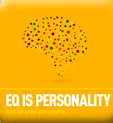Among the various core ingredients of talent and career success, few personal qualities have received more attention in the past decade than emotional intelligence (EQ), the ability to identify and manage your own and others’ emotions. Importantly, unlike most of the competencies that make it into the HR zeitgeist of buzzwords, EQ is no fad.

In fact, thousands of academic studies have demonstrated the predictive power of scientific EQ assessments vis-à-vis job performance, leadership potential, entrepreneurship, and employability. Moreover, the importance of EQ has been highlighted beyond work-related settings, as higher scores have been associated with relationship success, mental and physical health, and happiness.
All this is good news for people with higher EQ. But what can those with lower scores do to improve their intrapersonal and interpersonal skills? Is it possible to increase your own and others’ EQ beyond its natural levels? While Goleman and other popular writers argue that (unlike IQ) EQ is malleable and trainable, EQ is really just a combination of personality traits. Accordingly, it is not set in stone; it is largely heritable, shaped by childhood experiences, and fairly stable over time.
This does not mean that the effort put toward sculpting emotionally intelligent behaviors is a waste of time. It simply means that focus and dedication is required. The same goes for helping others to act with EQ when they are not naturally inclined to do so. Here are five critical steps for developing EQ:
Turn self-deception into self-awareness. Personality, and thereby EQ, is composed of two parts: identity (how we see ourselves) and reputation (how others see us). For most people there is a disparity between identity and reputation that can cause them to ignore feedback and derail. Real self-awareness is about achieving a realistic view of one’s strengths and weaknesses and of how those strengths and weaknesses compare to others’. For instance, most people rate their own EQ highly, yet only a minority of those individuals will be rated as emotionally intelligent by others. Turning self-deception into self-awareness will not happen without accurate feedback, the kind that comes from data-based assessments such as a valid personality tests or 360-degree feedback surveys. Such tools are fundamental to help us uncover EQ-related blind spots, not least because other people are generally too polite to give us negative feedback.
Turn self-focus into other-focus. Paying due attention to others is tantamount to career success. But for those with lower levels of EQ, it’s difficult to see things from others’ perspectives, especially when there is no clear right or wrong way forward. Developing an other-centric approach starts with a basic appreciation and acknowledgement of team members’ individual strengths, weaknesses, and beliefs. Brief but frequent discussions with team members will lead to a more thorough understanding of how to motivate and influence others. Such conversations should inspire ways to create opportunities for collaboration, teamwork, and external networking.
Be more rewarding to deal with. People who are more employable and successful in their career tend to be seen as more rewarding to deal with. Rewarding people tend to be cooperative, friendly, trusting, and unselfish. Unrewarding individuals tend to be more guarded and critical; they are willing to speak their minds and disagree openly but can develop a reputation for being argumentative, pessimistic, and confrontational. Although this reputation helps enforce high standards, it’s only a matter of time before it erodes relationships and the support for initiatives that accompany them. It’s important that these individuals ensure an appropriate level of interpersonal contact before tasking someone or asking them for help. Proactively and frequently sharing knowledge and resources without an expectation for reciprocity will go a long way.
Control your temper tantrums. Passion and intense enthusiasm can easily cross the line to become moodiness and outright excitability when the pressure’s on. Nobody likes a crybaby. And in the business world, those who become particularly disappointed or discouraged when unanticipated issues arise are viewed as undeserving of a seat at the grown-ups’ table. If you’re one of many people who suffer from too much emotional transparency, reflect on which situations tend to trigger feelings of anger or frustration and monitor your tendency to overreact in the face of setbacks. For example, if you wake up to a bunch of annoying emails, don’t respond immediately — wait until you have time to calm down. Likewise, if someone makes an irritating comment during a meeting, control your reaction and keep calm. While you cannot go from being Woody Allen to being the Dalai Lama, you can avoid stressful situations and inhibit your volatile reactions by detecting your triggers. Start working on tactics that help you become aware of your emotions in real time, not only in terms of how you experience them, but, more important, in terms of how they are being experienced by others.
Display humility, even if it’s fake. Sometimes it can feel like you’re working on an island managed by six-year-olds. But if you’re the type of person who often thinks, “I’m surrounded by idiots,” then it’s likely that your self-assured behaviors are seen as being arrogant, forceful, and incapable of admitting mistakes. Climbing the organizational ladder requires an extraordinary degree of self-belief, which, up to a certain point, is seen as inspirational. However, the most-effective leaders are the ones who don’t seem to believe their own hype, for they come across as humble. Striking a healthy balance between assertiveness and modesty, demonstrating receptiveness to feedback and the ability to admit one’s mistakes, is one of the most difficult tasks to master. When things go wrong, team members seek confident leadership, but they also hope to be supported and taught with humility as they work to improve the situation. To develop this component of EQ, it is sometimes necessary to fake confidence, and it’s even more important to fake humility. We live in a world that rewards people for hiding their insecurities, but the truth is that it is much more important to hide one’s arrogance. That means swallowing one’s pride, picking and choosing battles, and looking for opportunities to recognize others, even if you feel you are right and others are wrong.
While the above recommendations may be hard to follow all the time, you will still benefit if you can adopt them some of the time. Much as with other coaching interventions, the goal here is not to change your personality but to replace counterproductive behaviors with more-adaptive actions — to build new habits that replace toxic tendencies and improve how others perceive you. This is why, when coaching works, it invalidates the results of a personality test: Your default predispositions are no longer evidenced in your behaviors.
This article was originallypublished in Harvard Business Review on January 9, 2017, and was authored by Tomas Chamorro-Premuzic and Michael Sanger.




 Emotional intelligence, or EQ, is the ability to identify and manage your own and others’ emotions. While this is important in any business, it is especially integral in the healthcare industry.
Emotional intelligence, or EQ, is the ability to identify and manage your own and others’ emotions. While this is important in any business, it is especially integral in the healthcare industry. Emotional intelligence, or EQ, is the ability to identify and manage your own and others’ emotions. While this is important in any business, it is especially integral in the healthcare industry.
Emotional intelligence, or EQ, is the ability to identify and manage your own and others’ emotions. While this is important in any business, it is especially integral in the healthcare industry.

 As a leader in personality assessment, we've been studying this stuff for decades (really, ask us anything). We know cognitive ability is only a partial predictor of career success. In most jobs, it's EQ, the ability to identify and manage your own and others' emotions, that really matters. People skills determine success, and individuals who lack the ability to build effective relationships are destined to fail -- no matter how smart or talented they are.
As a leader in personality assessment, we've been studying this stuff for decades (really, ask us anything). We know cognitive ability is only a partial predictor of career success. In most jobs, it's EQ, the ability to identify and manage your own and others' emotions, that really matters. People skills determine success, and individuals who lack the ability to build effective relationships are destined to fail -- no matter how smart or talented they are.  As a leader in personality assessment, we’ve been studying this stuff for decades (really, ask us anything). We know cognitive ability is only a partial predictor of career success. In most jobs, it’s EQ, the ability to identify and manage your own and others’ emotions, that really matters. People skills determine success, and individuals who lack the ability to build effective relationships are destined to fail — no matter how smart or talented they are.
As a leader in personality assessment, we’ve been studying this stuff for decades (really, ask us anything). We know cognitive ability is only a partial predictor of career success. In most jobs, it’s EQ, the ability to identify and manage your own and others’ emotions, that really matters. People skills determine success, and individuals who lack the ability to build effective relationships are destined to fail — no matter how smart or talented they are.
 Who wouldn't want a higher level of emotional intelligence? Studies have shown that a high emotional quotient (or EQ) boosts career success, entrepreneurial potential, leadership talent, health, relationship satisfaction, humor, and happiness. It is also the best antidote to work stress and it matters in every job — because all jobs involve dealing with people, and people with higher EQ are more rewarding to deal with.
Who wouldn't want a higher level of emotional intelligence? Studies have shown that a high emotional quotient (or EQ) boosts career success, entrepreneurial potential, leadership talent, health, relationship satisfaction, humor, and happiness. It is also the best antidote to work stress and it matters in every job — because all jobs involve dealing with people, and people with higher EQ are more rewarding to deal with.